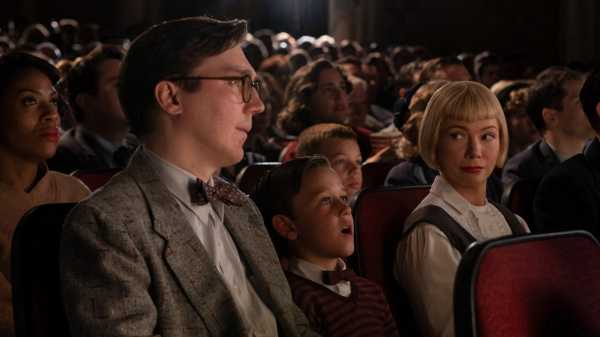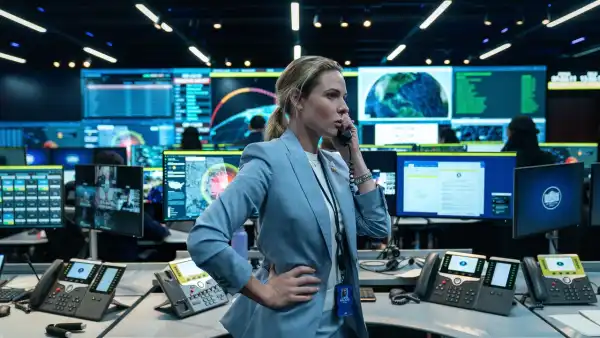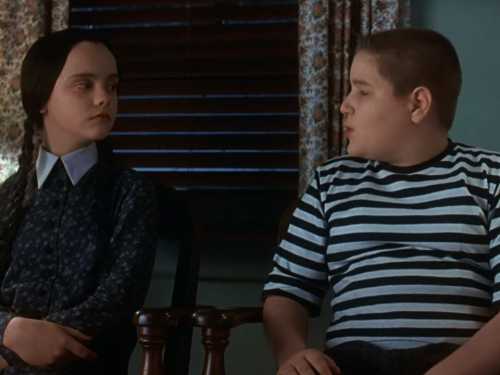
“Seventy-five years of life experience went into this,” Steven Spielberg told the crowd at the Toronto International Film Festival earlier this month, before unveiling his latest film, “The Fabelmans.” This world première was perhaps the biggest curiosity at TIFF: it was the first Spielberg-directed movie to be entered at a film festival, and its subject is the director as a young man. At long last, here was Spielberg’s song of himself: a bildungsroman from the filmmaker who has shaped nearly half a century of the American popular imagination. Whatever you think of Spielberg as a director, “The Fabelmans” is noteworthy as a kind of skeleton key that unlocks his cinematic world: the shark, the extraterrestrial, D Day. It’s as much a movie as a pop Freudian event.
“The Fabelmans” follows a nuclear family’s implosion and the filmmaker who emerges from the wreckage. When we meet the young Sammy Fabelman (Mateo Zoryon Francis-DeFord), he’s about to see his first movie, Cecil B. DeMille’s “The Greatest Show on Earth.” The date—recalled with precision, like that of a nation’s founding—is January 10, 1952. Outside the theatre, Sammy’s father, Burt (Paul Dano), an engineer who understands machines better than he understands humans, explains the mechanics of the moving image. Sammy’s mother, Mitzi (Michelle Williams), a classical pianist with an artist’s vivacious, erratic soul, says that movies are like dreams. “Dreams are scary,” the boy retorts. He’s awestruck but terrified watching DeMille’s train-wreck scene, which he can exorcise from his nightmares only by re-creating it at home with a toy train set and an 8-mm. camera. “He’s trying get some kind of control over it,” his mother intuits, while his father dismisses Sammy’s interest in filmmaking as a “hobby.”
The suburban idyll crumbles as Mitzi becomes closer to Burt’s co-worker and best friend, Bennie (Seth Rogen), a cutup who has a borscht-belt charisma that Burt lacks—the kids call him “Uncle Bennie.” As a teen-ager, Sammy (now played by Gabriel LaBelle, a nebbishy dead ringer for Spielberg) becomes even more enamored of the movies, corralling his friends into making Westerns and war flicks. One juvenile effort, “Escape to Nowhere,” is a clear forerunner of “Saving Private Ryan”—Sammy’s attempt, as he tells his veteran dad, to simulate “your war.” Moviemaking is Sammy’s retreat from the disquieting family dynamics, but it also leads him to what he doesn’t want to see. Splicing together his home movies of a camping trip in Arizona, he spots his mother and Bennie canoodling in the background and realizes that the domestic unit called “the Fabelmans” is doomed. It’s no wonder that the adult Spielberg wanted to film suburban kids on bicycles: boyhood was his lost Eden, the castle that came crashing down.
Spielberg’s œuvre is often seen as an expression of boyish wonder, but “The Fabelmans” makes clear that its primary impulse is terror and trauma. The film only lightly fictionalizes his parents, Leah and Arnold Spielberg (to whom “The Fabelmans” is dedicated), and “Uncle” Bernie Adler, who became Leah’s second husband. Leah and Arnold both died within the past six years, and Spielberg said, at the Toronto première, “This film, for me, is a way of bringing my mom and dad back”—which may be another way of saying that he couldn’t have made it while they were alive. At a press conference the next day, Spielberg appeared in warm-dad mode, wearing sneakers, a blue suit, and a gray sweater-vest, and explained that the movie, like a lot of existential reckonings, emerged from the pandemic. “What is this going to mean for humanity?,” he recalled thinking as he followed the news in 2020. He was in a “vulnerable” age bracket, facing his own mortality and perhaps that of his species: “I thought, This is something I gotta get out of me now.” Stuck at home, he started Zooming with Tony Kushner, his writing partner since “Munich” (2005), four hours a day, three days a week. Spielberg compared Kushner to a therapist; Kushner, sitting onstage with him, joked, “I should have charged by the hour.”
“The Fabelmans” may be an invitation to put Spielberg on the couch, but he hasn’t exactly been a closed book all these years. “ ‘E.T.,’ ” he once said, “was about the divorce of my parents, how I felt when my parents broke up. I responded by escaping into my imagination to shut down all my nerve endings crying, ‘Mom, Dad, why did you break up and leave us alone?’. . . My wish list included having a friend who could be both the brother I never had and a father that I didn’t feel I had anymore.” In an “Inside the Actors Studio” clip that has circulated online, James Lipton, discussing “Close Encounters of the Third Kind,” makes quick psychoanalytic work of Spielberg: “Your father was a computer scientist; your mother was a musician. When the spaceship lands, how do they communicate?” The director, grinning strangely, replies, “You’ve answered the question.” He made “Hook”—which imagines a grownup Peter Pan who has become a workaholic dad—after becoming a parent himself. “Saving Private Ryan” followed a fifteen-year-long rift with his father; Spielberg resented Arnold’s role in the family’s disintegration until his mother explained that it was her fault, too. “I spun around and realized I had been putting too much blame on the wrong person,” Spielberg said, in 1999. “That’s when I began to try to figure out how I could earn my father’s love back.”
“The Fabelmans,” though, dispenses with metaphor. Its most intriguing scenes hover around taboos, and you can feel the director itching to avert his eyes. It’s uncomfortable for anybody, especially a good son like Spielberg, to contemplate the sexuality of one’s mother, but it’s an unavoidable subject in his family story. After the Toronto première, Spielberg joined the cast onstage and explained that he took an interest in Michelle Williams—and ultimately cast her as his mother—after seeing her in the erotic drama “Blue Valentine.” (How’s that for Freudian?) In one unsettling scene, Mitzi, in a moment of exhibitionism, dances in her nightgown during the Arizona camping trip, and Bennie turns on the car headlights to give Sammy light to capture it on film. One of his sisters, mortified, warns their mother that her nightgown is see-through, but she’s undeterred. Later on, when Sammy shows his family the footage, Mitzi tells him proudly, “You see me.” Only too well: when he discovers the intimate moments between her and Bennie, he forces Mitzi to watch the damning outtakes, catching the conscience of a mother who has let an uncle usurp a father. All this time, we thought we were dealing with Peter Pan. It turns out that Spielberg was Prince Hamlet.
Sammy’s queasiness at his mother’s lust inevitably makes his own sexuality a minefield. The family moves from Arizona to Northern California, a land of goyim where Sammy is persecuted by sandy-haired, anti-Semitic bullies who remind him of towering sequoias. His sexual awakening comes courtesy of a Christ-loving shiksa goddess who fetishizes Sammy as a “handsome Jewish boy,” just like Jesus. We’re not in “Portnoy’s Complaint” territory here—Spielberg has little taste for perversion—but we’re not that far, either. One of Sammy’s sisters points out that his homemade movies have no good parts for girls, a nod to Spielberg’s blind spot for female characters. For most of his career, daddy issues (“Hook,” “Catch Me If You Can”) have blocked out mommy issues. But “The Fabelmans” is a corrective, giving Williams, in her Gwen Verdon-brassy mode, a role that may well win her an Oscar.
The film’s warm reception at TIFF, where on Sunday it won the festival’s People’s Choice Award, signalled that “The Fabelmans” is now at the head of the pack in this season’s Oscar race. (This is the first in a regular column in which I’ll be covering awards season and the business of Hollywood.) Williams, especially, is a strong contender, even stronger if she runs (fairly or not) in the Best Supporting Actress category and sidesteps the more crowded Best Actress field. Judd Hirsch, who has a brief but indelible role as an older relative teaching young Sammy about the thrills and perils of the artistic life, is a good bet for Best Supporting Actor—in Toronto, his last shot got exit applause. But Spielberg himself has a spotty Oscar history. His breakout film, “Jaws,” was nominated for Best Picture, in 1976, but he was passed over for Best Directing, with a documentary crew on hand to immortalize his humiliation. Even as his hitmaker status cemented, Spielberg became notorious for losing Oscars: for “Close Encounters” (he lost to Woody Allen, for “Annie Hall”); for “Raiders of the Lost Ark” (Warren Beatty, “Reds”); for “E.T.” (Richard Attenborough, “Gandhi”). In 1986, “The Color Purple,” his adaptation of the Alice Walker novel, was nominated for eleven Oscars (but not Best Directing) and lost them all. It wasn’t until 1994, with “Schindler’s List,” that Spielberg pulled off a Best Picture–Best Directing coup, but it hasn’t happened since. In 1999, he won the directing prize again, for “Saving Private Ryan,” but it infamously lost Best Picture to “Shakespeare in Love,” which was backed by an Oscar-ravenous Harvey Weinstein. Even in more recent years, as Spielberg has aged into a Hollywood elder statesman, his serious movies (“Lincoln,” “The Post,” “West Side Story”) have got lost in the Oscar shuffle. But “The Fabelmans” asks Academy voters to consider Spielberg in a new light: not as a success story but as a wounded boy who found salvation in the movies.
Of course, cinematic memoir is nothing new—Fellini had “Amarcord,” Truffaut “The 400 Blows”—and “The Fabelmans” joins a wave of autobiographical movies by high-profile directors. In recent years, we’ve seen watchful boys and troubled adults in Alfonso Cuarón’s “Roma,” Kenneth Branagh’s “Belfast,” and Lee Isaac Chung’s “Minari,” to name a few. This year’s crop includes Sam Mendes’s “Empire of Light” (starring Olivia Colman as a woman based on Mendes’s mother) and James Gray’s masterly “Armageddon Time,” set in early-eighties Queens. The best of these mine the tension between childhood memory and the revelation that comes with age and distance—the double vision that brings into focus a beloved nanny or a broken dad or a disadvantaged schoolmate. “The Fabelmans” takes an uncomfortable look at the hard stuff, but, if it feels more indulgent than the others, it’s because Spielberg is also in the business of self-mythologizing. “The Fabelmans” has a crowd-pleasing finale that sparkles like a Hollywood origin story, placing Sammy in a lineage of filmmaking giants—a new kind of family to replace the fallen Fabelmans. The film feels, in some ways, like a prequel to existing I.P.: the Big Bang of the Spielberg multiverse.
A late subplot, in which Sammy inadvertently mortifies one of his tormentors after filming him playing beach volleyball, reveals a more complicated relationship to the camera than Spielberg has previously let on: it’s a cocoon for Sammy to hide in, but it’s also a weapon. (Spielberg once said, “I wanted to do ‘Jaws’ for hostile reasons. . . . It terrified me, and I wanted to strike back.”) At the Toronto press conference, Spielberg ruminated, “I’ve always been able to put a camera between myself and reality, just to protect myself,” a defense mechanism that he was forced to set aside to make “The Fabelmans.” Kushner, playing therapist again, pushed back: “I don’t think that he actually does keep the camera between himself and real life in any of his movies. I think the thing that makes him who he is and makes those movies as great as they are is that there’s an emotional depth and power in everything he does.” The camera may have made the young Spielberg feel safe, Kushner went on, but the thing that makes you feel safe tends to “lead you back to the truth, which is: the world is not safe.” There are always sharks in the water. ♦
Sourse: newyorker.com






